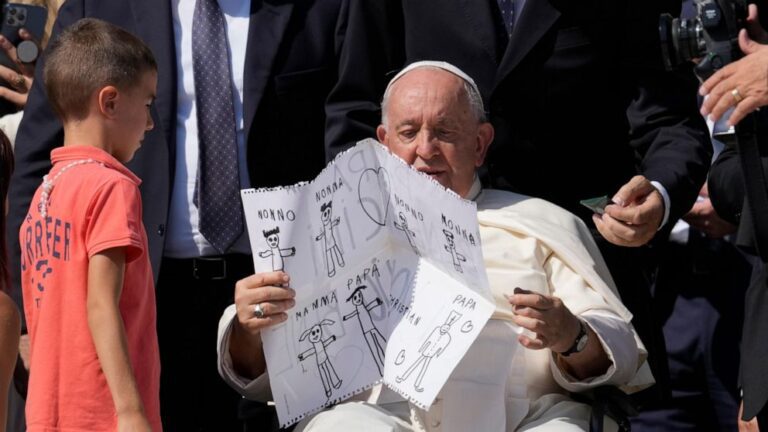The Greek-Catholic bishops of Ukraine have lodged a complaint with the Holy See itself concerning the diplomatic neutrality of the Vatican in the war waged by Russia against their country.
ROME — The Greek-Catholic bishops of Ukraine have declared Pope Francis His words on Wednesday praising Russia’s imperial past pained the Ukrainian people, bringing to the heart of the Holy See complaints about the Vatican’s diplomatic neutrality in Moscow’s war against their country.
The bishops were in Rome for a periodic meeting and met with the pope in person for nearly two hours. They arrived an hour earlier, at 7 a.m., at the pope’s invitation, so he could listen to them without rushing, attendees said.
While thanking Francis for his prayers, the bishops said certain statements and gestures by the Pope and the Vatican “are painful and difficult for the people of Ukraine, who are currently bleeding in the struggle for their dignity and independence,” according to a statement from the Vatican. his Church. Beatitude Sviatoslav Shevchuk, head of the Greek Catholic Church of Ukraine.
The 86-year-old Jesuit pope has sparked anger on both sides of the war. He repeatedly expressed solidarity with the “martyred” Ukrainian people – 227 times according to the count of Ukrainian bishops – but also refused to name Russia or President Vladimir Putin. He apparently expressed his understanding of the Putin-ordered invasion by saying that NATO was “barking at Russia’s door” by expanding eastward.
Ukrainian Greek Catholics felt betrayed by such comments and were again outraged last month when Francis praised imperial Russia during an August 25 video meeting with young Russian Catholics gathered in St. Petersburg.
“You are the heirs of the great Mother Russia,” Francis told the young people.
Moscow in turn hailed the pope’s remarks, which the kyiv government called “imperialist propaganda”.
The Ukrainian bishops thanked Francis for his support for the Ukrainian people, as well as for his humanitarian efforts and initiatives to free prisoners and negotiate the return of Ukrainian children taken to Russia. But Shevchuk told the pope that “the faithful of our Church are sensitive to every word of Your Holiness as the universal voice of truth and justice.”
Francis referred them to what he told reporters on Monday as he returned from Mongolia. He admitted during a press conference aboard the papal plane that his reference to Russian imperial leaders Peter the Great and Catherine II was “perhaps not happy”. He explained that he mentioned the two because he learned about them in school and wanted to emphasize that young people should embrace their heritage and culture.
The Vatican said in a statement Wednesday that Francis had listened carefully to what the Ukrainian bishops were telling him.
“He expressed his pain at the feeling of helplessness felt in the war,” the Vatican said, quoting Francis as saying such feelings of helplessness must come from “something of the devil who wants to destroy.”
François also remembers seeing “one of the fruits of war” in the faces of Ukrainian children who “had lost their smiles”.
He agreed to dedicate the month of October to prayers for peace in Ukraine and told the bishops that he prayed daily for peace before an icon of the Virgin Mary that Shevchuk had given him long before the war, when the two men lived in Buenos Aires.
The Very Reverend Kenneth Nowakowski, Bishop of Ukrainian Catholics in Britain, said the bishops were particularly moved by the fact that Francis had brought the icon with him to show them and that he was devoting two hours of his morning listening to them. while still recovering from his visit to Mongolia.
“To be actively listened to by the Holy Father in a calm, non-bureaucratic atmosphere, I think for us has been incredible,” he told The Associated Press, adding that other Vatican officials were all so generous with their time.
The Vatican has a diplomatic tradition of not taking sides in conflicts, believing that such neutrality can open the door to peace initiatives. Francis has tasked a seasoned Church peace negotiator, Italian Cardinal Matteo Zuppi, with shuttle diplomacy regarding the return of Ukrainian children from Russia.
His off-the-cuff interventions caused headaches for Holy See diplomats, but Vatican Secretary of State Cardinal Pietro Parolin defended the pope and his initiatives when meeting with Ukrainian Catholic leaders on Tuesday.
“Faced with such significant and repeated gestures, it would be unfair to doubt his affection for the Ukrainian people and their efforts, not always understood and appreciated, to help end the ongoing tragedy and ensure a just and stable peace. through negotiation,” Parolin told the bishops.


